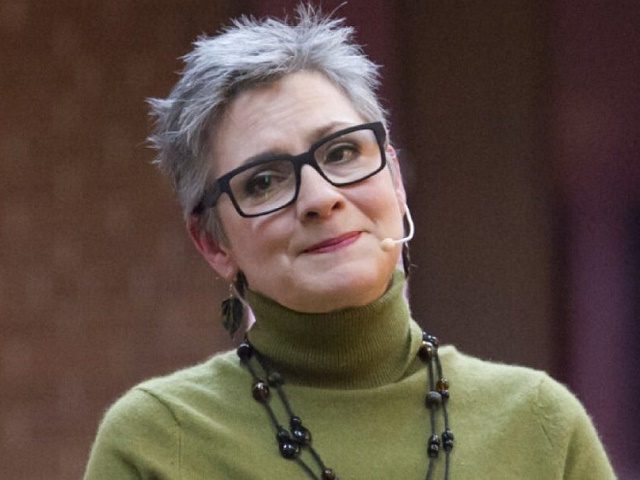The pastor of West Hill United Church has found herself in the middle of a firestorm ever since she came out publicly as a disbeliever, raising the question of just how far this big Christian tent can stretch.
Progressive Christian churches that have adopted inclusivity as their defining virtue find themselves ill-equipped to oust a member, even when that member has overtly rejected the fundamental tenets of the faith.
Ordained in the Canadian United Church in 1993, the Rev. Gretta Vosper slowly began doubting the truths of Christianity until she found herself an avowed atheist, denying not only the divinity of Jesus Christ but even the notion of God altogether. All this time, however, she continued to lead her church, deemphasizing questions of the supernatural while stressing community based on secular values of inclusiveness and compassion.
Reports suggest that the 58-year-old pastor has a “loyal following” at her Protestant congregation in suburban Toronto, which she describes as a good fit for nonbelievers “looking for a community that will help them create meaningful lives without God.”
Meanwhile, however, even in the liberal United Church of Canada, members have begun to question the suitability of a church leader who denies God’s existence, especially when her resistance to faith seems to border on provocation. Vosper has announced that it is time that the Christian church gave up on “the idolatry of a theistic god.”
Members of the flock have expressed their consternation in a variety of ways, wondering aloud how a declared atheist can be allowed to lead a confessionally Christian congregation.
“My understanding is that the United Church of Canada is a ‘Christian’ church based on the teachings of Jesus Christ,” Pamella Fell wrote on a United Church website. “Why, why, why is she still with the UCC if she isn’t a Christian?”
A columnist in the Toronto Star even suggested that a Christian church sponsoring an atheist minister is like “Alcoholics Anonymous hosting a pub crawl.”
In the face of the uproar over this glaring contradiction, a special committee of the Toronto Conference of the United Church has finally taken action, and earlier this month requested that the Church’s General Council conduct a formal hearing of the case.
“In our opinion, she is not suitable to continue in ordained ministry because she does not believe in God, Jesus Christ or the Holy Spirit. Ms. Vosper does not recognize the primacy of scripture, she will not conduct the sacraments, and she is no longer in essential agreement with the statement of doctrine of The United Church of Canada,” the divided committee said in its report.
And still the United Church, which prides itself on its inclusiveness, is treating the matter gingerly, reluctant to declare anything off-limits.
“At the heart of the concerns being raised is a tension between two core values, both of which are central to our identity as United Church. The first is our faith in God. The second is our commitment to being an open and inclusive church,” wrote the Right Reverend Jordan Cantwell, head (moderator) of the United Church of Canada.
The crux of the matter seems to be that for a church that has progressively embraced every aspect of secular culture, it has become hard to say “no” to anything. With a wink to the Bible, the United Church has accepted abortion and same-sex marriage and divorce and female ordination and openly gay ministers. But atheism seems a bridge too far.
In other words, for the United Church, it’s all right to “mold” your idea of God so that he (or she) can approve of homosexual sex and trangenderism and killing babies in the womb, but please don’t deny the divinity outright.
Then again, for Canada’s largest Protestant denomination, perhaps atheism is the greatest “protest” of all. “For some,” wrote Rev. Cantwell, having an atheist minister “is simply a natural extension of our commitment to be an open, inclusive, and questioning church,” adding that “diversity in our church has been and will continue to be a source of strength.”
“It’s tough on the United Church because we’ve created this mantra of inclusiveness and now it’s been tested,” said the Rev. Don Schweitzer, a professor of theology at St. Andrew’s College in Saskatoon. “It goes against the grain to tell somebody that you have to leave.”
Follow Thomas D. Williams on Twitter Follow @tdwilliamsrome

COMMENTS
Please let us know if you're having issues with commenting.